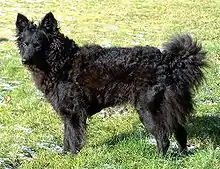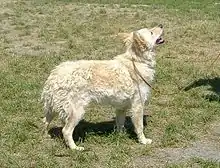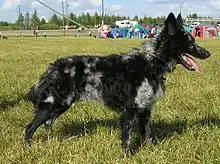Mudi
The Mudi (in Hungarian, the plural form of mudi is mudik) is a herding dog breed from Hungary. It is closely related to the Puli and Pumi, from which it was separated in the 1930s. Today, the Mudi is bred for work, sport, companionship, and show. They continue to be used in herding, as well as participating in a variety of dog sports.
| Mudi | |||||||||
|---|---|---|---|---|---|---|---|---|---|
 A black Mudi | |||||||||
| Other names | Hungarian Mudi Canis Ovilis Fenyesi | ||||||||
| Origin | Hungary | ||||||||
| |||||||||
| Dog (domestic dog) | |||||||||
History
The Mudi was first discovered as a breed in 1936 by Dr. Dezso Fenyes in Hungary, where it became known as the "driver dog." Mudis nearly disappeared shortly after their recognition, as many were killed during World War II. The breed became recognized by The Federation Cynologique Internationale in 1966, followed by the United Kennel Club in 2006. In the American Kennel Club, Mudi are in the Miscellaneous Class.[1] The Mudi still actively herds in Hungary with Hungarian shepherds and with flocks of up to 500 sheep. [2]
Description
Appearance

Mudi usually weigh 18 to 29 pounds (8.2 to 13.2 kg) and stand 15 to 19 inches (38 to 48 cm) high at the withers. The coat is medium wavy or curly, with short hair on the face and legs.[3] The accepted colors are black (fekete), brown (barna), white (fehér), Fawn (fakó), Ash (hamvas), and Cifra (marbling of black and gray.) Mudis are born with various lengths of tails from bobtails to long full length tails. Dogs born with short or natural bobtail will be indicated on the FCI pedigree. The Mudi standard indicates other characteristics of the breed.[4]
Temperament
The Mudi is a versatile farm dog that can hunt, exterminate rodents, and act as a capable herding dog and flock guardian. They are great for alerting and protecting their home and family. They have a high pitched bark and are often very loud.There are three herding dogs native to Hungary: the Puli, Pumi and Mudi, all having similar characteristics. The Mudi is a clever, keen, active dog who becomes very attached to its owner and family. They are often aloof with strangers and early socialization is recommended. The Mudi is often talked about as being "the barkiest breed". The Mudi is not recommended for the typical dog owner due to not only its high energy but also that many in the breed have temperament issues and struggle with fearfulness and reactivity.
Exercise and activities
The Mudi is a very active breed. They need to be taken on a daily, long, brisk walks or jogs. In addition, they will benefit from a large safe area where they can run free. They need a lot of running and other exercises to be in good condition. They love to play and will excel in all kinds of dog sports such as Frisbee. The Mudi can compete in dog agility trials, obedience, Rally obedience, Schutzhund, showmanship, flyball, tracking, and herding events. Herding instincts and trainability can be measured at noncompetitive herding tests. Mudi that exhibit basic herding instincts can be trained to compete in herding trials.[5]

Health problems
The Mudi is a generally healthy breed. Some health problems that have been seen in the Mudi include, hip dysplasia, epilepsy, cataracts, elbow dysplasia and patellar luxation.
Living conditions
The Mudi can live in an apartment if it is sufficiently exercised. However, they need space to run and play and are more suited to a larger space. They are moderately active indoors and will do best with at least a large yard.
Life expectancy
About 13–14 years. Although, two Mudis in Canada lived to 17.5 years of age.
Grooming
With its short coat, the Mudi is generally easy to groom. The Mudi's coat sheds dirt and hair, however, does not require frequent bathing. A weekly brushing is sufficient and their coat does not need trimming. The Mudi sheds in the spring and does not fully regain his coat until the end of summer. Their nails should be cut every few weeks as needed, along with basic care.
References
- "Miscellaneous Class".
- "Mudi History & Training/Temperament". Akc.org. Retrieved 11 December 2017.
- "Mudi - Royal Canin". Royal Canin. Archived from the original on 29 April 2012. Retrieved 25 September 2015.
- "Mudi Club of America". www.mudi.us.
- Hartnagle-Taylor, Jeanne Joy; Taylor, Ty (2010). Stockdog Savvy. Alpine Publications. ISBN 978-1-57779-106-5.
External links
| Wikimedia Commons has media related to Mudi. |
- Mudi Association of Canada
- "* Mudi (Dog) - Definition,meaning - Online Encyclopedia". En.mimi.hu. Retrieved 11 December 2017.
- American Mudi Association
- Mudi Club of America
- "Mudi Dog Breed Information". Akc.org. Retrieved 11 December 2017.